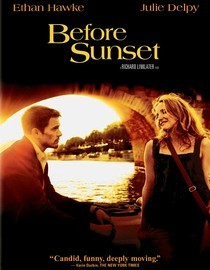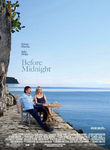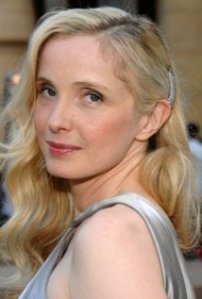Before Sunrise
Before Sunset
Before Midnight
starring Ethan Hawke and Julie Delpy
As series go, the “Before‘s” aren’t half bad. I’ll even go so far as to say that, as entertainment, they’re two-thirds great: Before Sunrise and Before Sunset are quite compelling. Each could stand alone, but why make them do that when viewing without pause a six-hour saga spanning half a lifetime is so much fun? That’s the joy of rentals, I’ve discovered: watching an entire season of Homeland or Breaking Bad over the course of a few days is so much more satisfying than weekly viewings dragged out over several years.
The plot of the Before trilogy sounds on the surface deceptively simple: boy meets girl; boy loses girl; boy gets girl. In Before Sunrise, Jesse, an American played by Ethan Hawke, meets the French Celine (Julie Delpy) on a train speeding through Europe the night before he’s heading home. His plane leaves from Vienna in the morning, and when the train reaches his station he spontaneously asks Celine to get off and spend the night with him. This is not an indecent proposal, since he has no money for a hotel and plans to roam the city streets all night. After a beat or two she says yes—oh, to be young, for only the young take such risks! And hey, if she hadn’t gone, look what they, and we the audience, would have missed.
Parting is such sweet sorrow: after a night communing with Vienna and each other, they agree to meet in the same place in six months’ time to see if they still feel connected. As the sun rises, the first movie ends, leaving the audience suspended.
The second film, Before Sunset opens with Jesse hawking the novel he wrote based on what happened before sunrise. He’s in Paris giving a reading—as if! First-time novelists are rarely if ever whisked by their publishers on worldwide publicity tours accompanied by their own personal limo driver. Maybe this occasionally happened in, say, 1948, but certainly not in the 90s when the movie takes place. That’s just one of the ways in which the Before‘s get the writing life wrong: in other scenes Jesse tells anyone he happens to meet the entire plot of his next as yet unwritten novel, a sure sign of the rank amateur.
Caveat, Jesse: Talking about an unwritten book guarantees you won’t write it. That’s not some superstition, either: when you talk out the story you dissipate the creative energy needed to write it. If you tell it first, by the time you get to a blank page, the story’s gone stale, and you have nothing left to say.
The first two Before‘s cover the most exciting phases in a relationship: meeting, anticipating, getting-to-know-you, and testing reality. No matter how many times it’s been told, these remain engaging; thus, the first two Before‘s cannot fail. Well, maybe they can, but they don’t.
 The trouble with Part The Third is a lack of conflict, at least for the first half. As any writing teacher will tell you, without obstacles there’s no story, especially no love story. Before Midnight opens on an almost ideal relationship. Only later, when the couple go off alone, away from their kids and their friends, does the plot thicken with a blowout. Here comes conflict in spades; the problem is that Jesse and Celine—mostly Celine, true to life—raise just about every issue you’d expect to be a source of strife in a contemporary relationship. I could have recited verbatim this part of the script, in which today’s couple conflicts are explored ad nauseum—which is predictably tedious. I may be wrong: perhaps if I were 35, married, and afraid my husband planned to haul my ass out of Paris to live in Chicago…well, then, sure, I’d relate to Before Midnight the way I related to Diary of a Mad Housewife in 1970. At that movie I sobbed my heart out : the protagonist’s story mirrored my own. Thus, I can see how a good portion of today’s audiences related to and loved Before Midnight.
The trouble with Part The Third is a lack of conflict, at least for the first half. As any writing teacher will tell you, without obstacles there’s no story, especially no love story. Before Midnight opens on an almost ideal relationship. Only later, when the couple go off alone, away from their kids and their friends, does the plot thicken with a blowout. Here comes conflict in spades; the problem is that Jesse and Celine—mostly Celine, true to life—raise just about every issue you’d expect to be a source of strife in a contemporary relationship. I could have recited verbatim this part of the script, in which today’s couple conflicts are explored ad nauseum—which is predictably tedious. I may be wrong: perhaps if I were 35, married, and afraid my husband planned to haul my ass out of Paris to live in Chicago…well, then, sure, I’d relate to Before Midnight the way I related to Diary of a Mad Housewife in 1970. At that movie I sobbed my heart out : the protagonist’s story mirrored my own. Thus, I can see how a good portion of today’s audiences related to and loved Before Midnight.
I could write an entire blog, if not a whole book, on another aspect of the third movie: Celine as a mother. For most of the film the
couple’s two daughters are invisible, either off playing somewhere, or asleep, or left with friends while the duo runs off for a romantic interlude. I couldn’t help but notice this, since every time I’ve created a fictional character who’s a mother, editors and agents have demanded I devote more time to the kids even when they have nothing to do with the story. I’ve been told that if I don’t, readers will dislike the main character: she’s seen as a Bad Mother. (As I said, it’s a whole separate blog I hope to get to someday.)
Of course, I didn’t lose sympathy for Celine—but then, I wouldn’t. I wonder about other viewers; after all, it’s clear that Celine’s career is a more important part of her life than motherhood. In Before Midnight, though, this somehow seems natural. A sign of changing times? French sensibility? Or is Celine just an unusual woman?
 Julie Delpy’s performance improves by leaps and bounds during the course of the trilogy. In the first two movies she’s an okay actress—but it’s in the latest installment that she really blossoms. Maybe it’s just because here she gets to play anger; whatever the reason, her acting chops have clearly evolved. It brings to mind the cliché that women reach their prime in their mid-thirties—only it isn’t such a cliché: in Before Midnight Julie the actress and Celine the character seem to have reached the peak of their powers. Celine’s career is about to take a great leap forward, and by movie’s end I fervently hoped Jesse wouldn’t drag her off to Chicago to waste the best years of her life.
Julie Delpy’s performance improves by leaps and bounds during the course of the trilogy. In the first two movies she’s an okay actress—but it’s in the latest installment that she really blossoms. Maybe it’s just because here she gets to play anger; whatever the reason, her acting chops have clearly evolved. It brings to mind the cliché that women reach their prime in their mid-thirties—only it isn’t such a cliché: in Before Midnight Julie the actress and Celine the character seem to have reached the peak of their powers. Celine’s career is about to take a great leap forward, and by movie’s end I fervently hoped Jesse wouldn’t drag her off to Chicago to waste the best years of her life.
We may never know—unless, that is, a fourth sequel is on the way.
Related articles
- Film Review | Before Midnight (thejournalist.ie)
- The Heartbreaking Genius Of “Before Midnight” (buzzfeed.com)
- Interview: Julie Delpy on the ideal way to watch the “Before” trilogy (thefilmexperience.net)
- What comes Before? – in praise of Linklater, Delpy and Hawke (jamesgillingham.wordpress.com)

